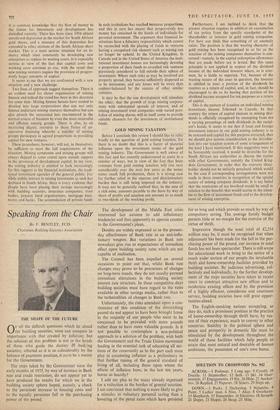Speaking from the Chair
THE SHAPE OF THE FUTURE
O17 all the difficult 'questions which lie ahead for building societies, none can compare in importance with that created by inflation; but the solution of this problem is not in the hands of those who guide the destiny Z1f builCing societies; affected as it is so considerably by -the balance of payments position, it must be a matter for the Government.
The steps taken by the Government since the early months of 1955, by way of increase in Bank rate and credit restriction, do not appear yet to have produced the results for which we in the building society sphere hoped, namely, a check to the persistent increase in housing costs and to the equally persiStent fall in the purchasing power of the pound.
The development of the Middle East crisis intervened last autumn to add inflationary tendencies and thus apparently to operate counter to the Government's plans.
Doubts are widely expressed as to the present- day effectiveness of Bank rate as an anti-infla- tionary weapon. But variations in Bank rate nowadays give rise to expectations of immediate effect upon building society rates which are not capable of realisation.
The Council has been impelled on several occasions to point out that, whilst Bank rate changes may prove to be precursors of changes on long-term trends, they do not usually portend immediate alterations in the building society interest rate structure. In these competitive days building societies must have regard to the rates available in other savings media, rather than to the technicalities of changes in Bank rate.
Unfortunately, the risks attendant upon a con- tinuance of this condition of the diminishing pound do not appear to have been brought home to the majority of our people who seem to be concerned to be provided with more pounds rather than to have more valuable pounds. Is it not possible to contemplate a non-political approach to a solution of the problem, with both the Government and the Trade Union movement leading in the essential task of educating all sec- tions of the community as to the part each must play in countering inflation as a preliminary to that further raising of the general standard of living of all, including those upon whom the effects of inflation have, in the last ten years, borne so heavily?
I add my plea to the many already expressed for a reduction in the burden of general taxation, I am convinced that nothing is more likely to give a stimulus to voluntary personal saving than a lowering of the penal rates which have persisted
for so long and which provide so much by way of compulsory saving. The average family budget permits little or no margin for the exercise of the virtue of thrift, Impressive though the asset total of £2,234 million may be, it must be recognised that when adjustment has been made for the fall in the pur- chasing power of the pound, our increase in total funds has not been spectacular. There is still scope for educational work to bring to the notice of a much wider section of our people the invaluable thrift and home-ownership facilities provided by building societies. By judicious advertising, col- lectively and individually, by the further develop- ment of the steps societies have taken in recent years to construct attractive new offices and to modernise existing offices and by the provision of a highly efficient, considerate and courteous service, building societies have still great oppor- tunities ahead.
The English-speaking nations occupying, as they do, such a prominent position in the practice of home-ownership through thrift have, by rea- son of their experience, much to convey to other countries. Stability in the political sphere and peace and prosperity in domestic life must be stimulated by the development throughout the world of those facilities which help people to attain that most natural and desirable of human ambitions, the possession of one's own home.


































 Previous page
Previous page